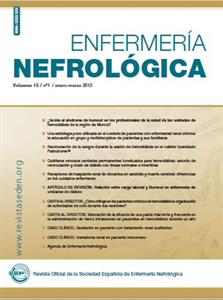Contenido del artículo principal
Resumen
Los objetivos fueron, aumentar los conocimientos, en nuestros pacientes con enfermedad renal crónica avanzada y su familia, sobre su enfermedad, su correcto cuidado y sobre el tratamiento renal sustitutivo, a través de la educación en grupo. Valorar si la información aumenta el nivel de ansiedad de los pacientes. Valorar el grado de satisfacción con la intervención educación en grupo.
Estudio retrospectivo que contó con 19 pacientes, asistentes a los dos cursos. Se realizaron dos cuestionarios al inicio y al final del curso sobre nivel de conocimientos y el nivel de ansiedad (Inventario de Ansiedad Estado-Rasgo). Al final de cada edición, se realizó un cuestionario de evaluación. Las variables estudiadas fueron el sexo, edad, nivel de estudios y asistencia de un familiar.
El nivel de conocimientos alcanzó una diferencia estadísticamente significativa entre ambos cuestionarios (inicial-final) (p = 0,013). Los resultados obtenidos en la evaluación del nivel de ansiedad mostraron un ligero incremento en la ansiedad. El cuestionario de satisfacción mostró una valoración muy positiva de la intervención.
Podemos concluir, que la mayoría de los pacientes han aumentado sus conocimientos sobre enfermedad renal crónica avanzada y técnicas de sustitución, han demostrado una alta satisfacción con la experiencia de esta intervención y la mayoría han experimentado un ligero aumento de ansiedad.
Palabras clave
Detalles del artículo
Derechos de autor 2012 Ana Isabel Aguilera-Flórez, Mario Prieto-Velasco, Luis González Romero, Beatriz Abad Toral, Elisa Martínez Crespo, Israel Robles del Río, Esperanza Gutiérrez Gutiérrez, Alicia Calleja Fernández, Pilar de Boso Serrano

Esta obra está bajo una licencia internacional Creative Commons Atribución-NoComercial 4.0.
Aviso de derechos de autor/a
© Los autores ceden de forma no exclusiva los derechos de explotación de los trabajos publicados y consiente en que su uso y distribución se realice con la Licencia Creative Commons Atribución - No comercial 4.0 Internacional (CC BY-NC 4.0). Puede consultar desde aquí la versión informativa y el texto legal de la licencia. Esta circunstancia ha de hacerse constar expresamente de esta forma cuando sea necesario.
Referencias
- Alcázar R; Orte L; Otero A. Enfermedad renal crónica avanzada. Guías SEN para el manejo de la enfermedad renal crónica avanzada y pre-diálisis. Nefrología 2008; Supl. 3, 3-6.
- Otero A, de Francisco A, Gayoso P, Garcia F: EPIRCE study Group. Prevalence of chronic renal disease in Spain: results of the EPIRCE study. Nefrología 2010; 30(1):78-86.
- Marrón B, Craver L, Remón C, Prieto M, Gutierrez J M, Ortiz A. ‘Reality and desire’ in the care of advanced chronic kidney disease. NDT plus 2010; 3(5):431-435.
- Coulter A, Ellins J. Effectiveness of strategies for informing, educating, and involving patients. BMJ 2007; 335(7609):24-27.
- Low J, Smith G, Burns A and Jones L. The impact of end-stage kidney disease (ESKD) on close persons: a literature review. NDT plus 2008; 1(2):67-79.
- Levin A, Lewis M, Mortiboy P, Faber S, Hare I, Porter EC et al. Multidisciplinary predialysis programs: quantification and limitation of their impact on patient outcomes in two Canadian settings. Am J Kidney dis 1997; 29(4):533-540.
- Spielberger CD, Gorsuch RL, Lushene RE. Inventario de Ansiedad Estado-Rasgo (State-Trait Anxiety Inventory, STAI), Manual STAI/Cuestionario de Ansiedad Estado-Rasgo, 2ª ed. Madrid: TEA Ediciones; 1986.
- Wu IW, Wang SY, Hsu KH, Lee CC, Sun CY, Tsai CJ et al. Multidisciplinary predialysis education decreases the incidence of dialysis and reduces mortality a controlled cohort study based on the NKF/DOQI guidelines. Nephrol Dial Transplant. 2009; 24(11):3426-3433.
Referencias
Alcázar R; Orte L; Otero A. Enfermedad renal crónica avanzada. Guías SEN para el manejo de la enfermedad renal crónica avanzada y pre-diálisis. Nefrología 2008; Supl. 3, 3-6.
Otero A, de Francisco A, Gayoso P, Garcia F: EPIRCE study Group. Prevalence of chronic renal disease in Spain: results of the EPIRCE study. Nefrología 2010; 30(1):78-86.
Marrón B, Craver L, Remón C, Prieto M, Gutierrez J M, Ortiz A. ‘Reality and desire’ in the care of advanced chronic kidney disease. NDT plus 2010; 3(5):431-435.
Coulter A, Ellins J. Effectiveness of strategies for informing, educating, and involving patients. BMJ 2007; 335(7609):24-27.
Low J, Smith G, Burns A and Jones L. The impact of end-stage kidney disease (ESKD) on close persons: a literature review. NDT plus 2008; 1(2):67-79.
Levin A, Lewis M, Mortiboy P, Faber S, Hare I, Porter EC et al. Multidisciplinary predialysis programs: quantification and limitation of their impact on patient outcomes in two Canadian settings. Am J Kidney dis 1997; 29(4):533-540.
Spielberger CD, Gorsuch RL, Lushene RE. Inventario de Ansiedad Estado-Rasgo (State-Trait Anxiety Inventory, STAI), Manual STAI/Cuestionario de Ansiedad Estado-Rasgo, 2ª ed. Madrid: TEA Ediciones; 1986.
Wu IW, Wang SY, Hsu KH, Lee CC, Sun CY, Tsai CJ et al. Multidisciplinary predialysis education decreases the incidence of dialysis and reduces mortality a controlled cohort study based on the NKF/DOQI guidelines. Nephrol Dial Transplant. 2009; 24(11):3426-3433.




